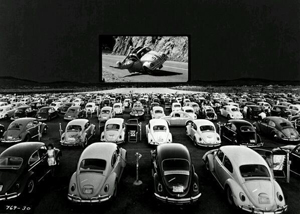For awhile now, 99% of the films generated have essentially gone unseen. The film industry is finally waking up to this overall change.
Are we now prepared for the next step? And the appropriate one at that?
We are on the verge of a new film culture and infrastructure.
For awhile now, 99% of the films generated have essentially gone unseen. The film industry is finally waking up to this overall change.
Are we now prepared for the next step? And the appropriate one at that?
By Charles Peirce
 As I alluded to in a previous post, Transmedia is in the midst of a debate about its definition and who has the authority to determine that definition. It is one of those discussions I think best observed from the sidelines, but then I have no financial or artistic stake in that debate. However, I do think they’re important terms to understand.
As I alluded to in a previous post, Transmedia is in the midst of a debate about its definition and who has the authority to determine that definition. It is one of those discussions I think best observed from the sidelines, but then I have no financial or artistic stake in that debate. However, I do think they’re important terms to understand.
Previously: Hard Work, Innovation & Blind Alleys
$45 Billion VOD Market
This is an amazing — and inspiring — forecast. Research company Markets and Markets predicts global video-on-demand (VOD) revenue will grow from $21 billion last year to $45 billion in 2018. They define this as the combined revenues of all VOD outlets, worldwide — essentially digital (online) VOD plus cable & satellite VOD. Huge numbers, but actually not a particularly high compound annual growth rate (16%) to get to the $45b number in years. Figure roughly half of this revenue flows to content owners and half to the VOD outlets.
by Andrew Einspruch
Filmmaker Andrew Einspruch attended Screen Forever 2013, the conference of Screen Producers Australia, this past year and wrote a series of articles for the event, which he’s kindly allowing us to reprint here. These articles originally appeared in Screen Hub, the daily online newspaper for Australian film and television professionals.
On a sunny day in Melbourne, where the clouds had clearly been swept away, Kim Wright, Film Producer with the Sesame Workshop, talked about the things that make Sesame Street a success. Screen Hub`s Andrew Einspruch reports from Screen Forever, the Screen Producers Australia conference.
Sesame Street is an amazing success story. Now in its 44th season of 26 episodes each (that`s over 1,100 episodes all up), the perennial favourite of the two-to-five set has kept a loyal fan base of children and former children. It has now been around long enough that some of its original viewers are now grandparents, sharing the show with a third generation.
According to Kim Wright, a key part of the show`s magic of the show is keeping it current. Some of that has to do with the writing, some of it the on-air and off-air talent, and some of it is the ability to adjust its curriculum over time.
And, of course, there`s the comedy and the celebrities. If Bert reads a copy of “Fifty Shades of Oatmeal,” or Usher sings the alphabet, it makes parents want to stay tuned, which keeps the kids tuned in as well.
Wright talked about how the show is developed. Each season starts with a curriculum meeting attended by all the show`s producers and writers (there`s a Head Writer and a team of ten additional writers). There, themes and issues that will be highlighted in the season are discussed. For example, they might be emphasising the idea of self-regulation, which includes things like being patient and controlling emotions. From there, the writers go off to work on scripts that address these themes, and the usual iterative process of writing ensues.
The show is structured in blocks, and each episode is made up of a predictable set of different blocks. For example, there will be a Word on the Street block, a number block, a letter block, a musical number from Elmo, a piece from Cookie Monster in a series called Crumby Films (parodies of current movies), and so on. The show is pieced together over months, with different elements being filmed at different times.
Wright also discussed the film commissioning process. They put out a Request for Pitch (RFP) three times a year. These requests ask filmmakers to come up with ideas for short films that can be included in the show. They can be live action, animation or mixed media. They might be 30 seconds long or a two-minute piece for a music video. There will be two or three films in any episode, and they might be about a letter, a number or something to do with the curriculum. Sesame Workshop basically puts it out there, and it is up to producers to come up with an idea that interests them enough to commission it.
I recently did a long and comprehensive interview with Scott Myers at GoIntoTheStory. We hit a lot of big points. I think you will dig it.
By Reid Rosefelt
Social Media networks go through phases in their lives, just as we do in ours.
Most of us go through periods of adjustment which we handle with varying degrees of success. Many of us don’t climb very high up the ladder of success, and it’s a rare few that become superstars like Justin Timberlake, Jennifer Lawrence, Facebook or Twitter.
Our final excerpt from Jessica Edwards’ new book Tell Me Something: Advice from Documentary Filmmakers comes from Michael Moore:

Here is my advice for those who want to make a documentary film that people will flock to the movie theaters to see:
The first rule of making a documentary is, don’t make a documentary. Make a movie. Nobody wants to see a documentary. To the often-posed question “Hey, honey, what do you wanna do tonight?” nobody responds with “Let’s go see a documentary!” People do, though, want to see a movie. And when they go to the movies, they want to be entertained. I know. I said the E-word. No serious documentary filmmaker would claim to be making something “entertaining,” because that would not only pack the theaters but also diminish the Seriousness and Importance of the Message he or she is trying to impart to the audience.
Well, guess what—nobody wants to sit in a movie theater and feel like he’s being taught a history lesson or preached to or scolded or told he must care about the plight of this or that. People don’t want the invisible wagging finger of the “documentarian” (a word invented for us because we don’t make movies) pointing at them and telling them to take their medicine. That’s why the theatrical audience for documentaries remains so low. It’s Friday night, you’ve worked hard all week, and now you want to relax and go see a movie about … Fracking! Pedophile Priests! My Father Who Deserted Me When I Was 9! Don’t get me wrong—we need to be alarmed about the first two, and the third one, well, I can’t help you with that. I got my own problems.